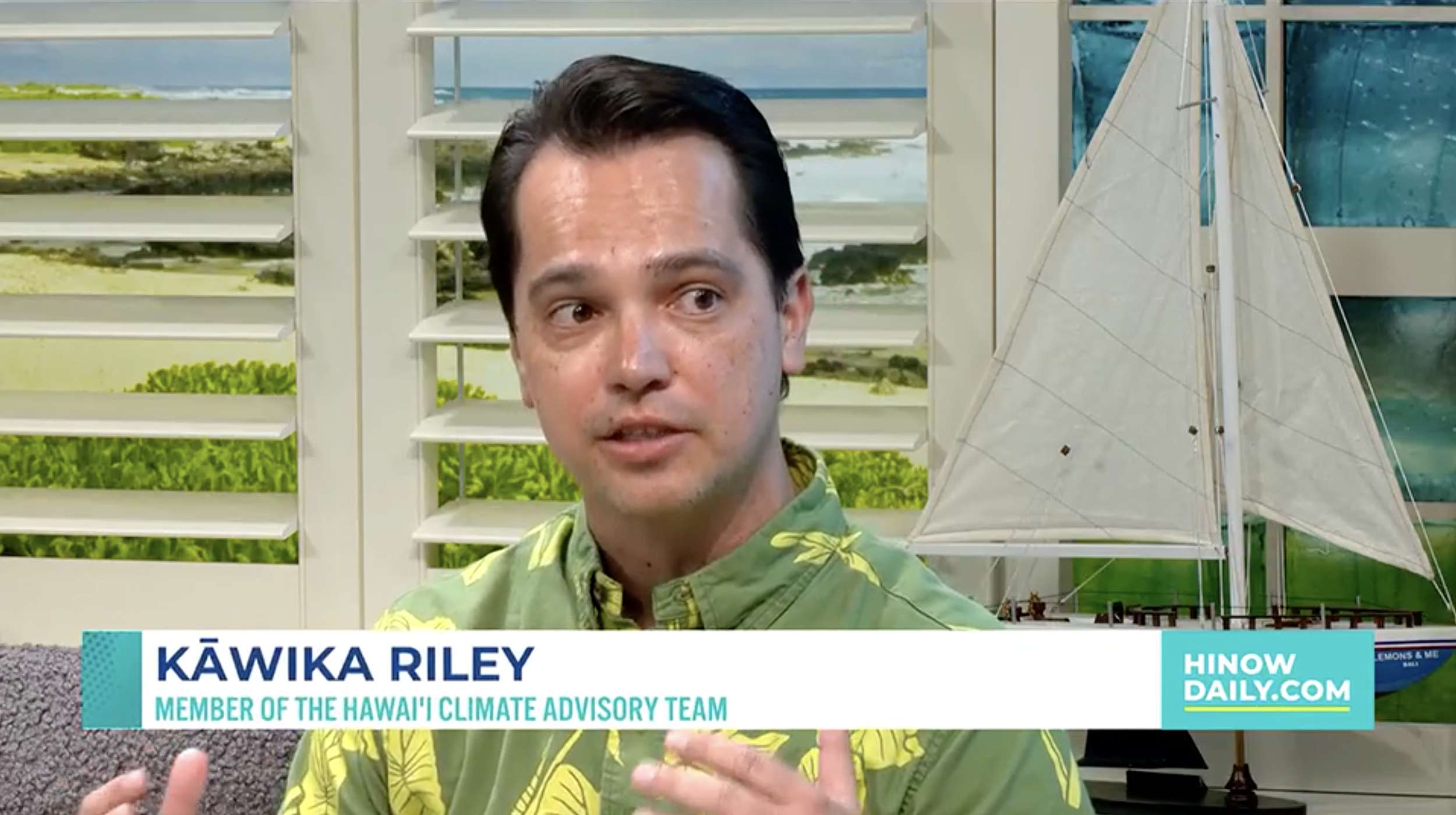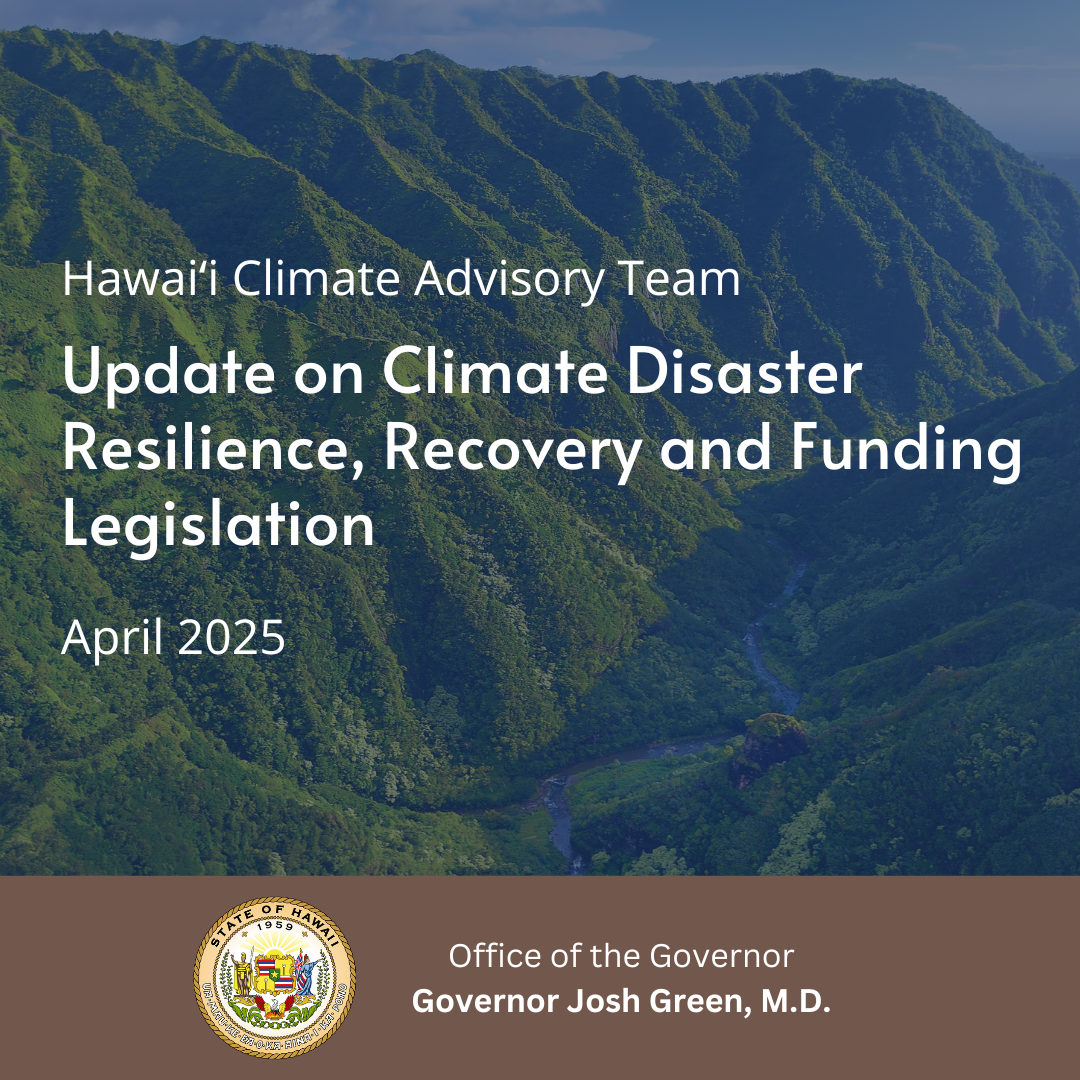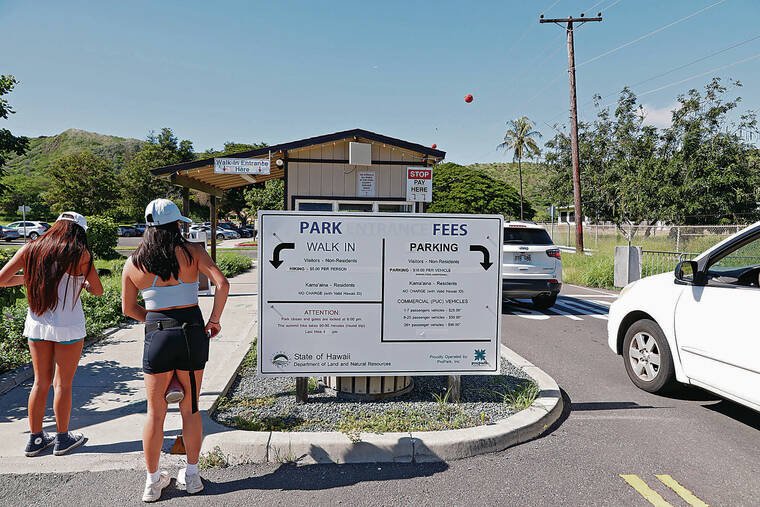News
The latest updates and information about the work of the Green Fee Advisory Council.
For journalist inquiries, please contact: christine@paakaicommunications.com

Legislative session ends with tourism tax increase to fund climate resiliency
By Ashley Mizuo for Hawaiʻi Public Radio
Bills are on their way to the governor, and state lawmakers are already looking into the future.
The legislative session wrapped up Friday with lawmakers passing the country’s first Green Fee — a tax on tourists to support the climate.
It raises the state’s tax on hotels by 0.75 of a percentage point to 11%. It also applies that 11% tax on cruise ships docking in Hawaiʻi. Hawaiʻi’s four counties separately each charge a 3% lodging tax.

Hawaiʻi Legislature Passes Landmark Disaster Resilience Legislation
By Climate Advisory Team
With the conclusion of Hawaiʻi’s 2025 legislative session, the Climate Advisory Team celebrates the Legislature’s passage of important bills that strengthen our state’s disaster resilience and climate change mitigation efforts. These bills now head to Governor Josh Green, M.D., to be signed into law.
Together, these measures represent a historic investment to protect Hawaiʻi’s people, environment, and economy from the impacts of a changing climate and support the state’s ongoing commitment to increase disaster resilience in the wake of the tragic 2023 Maui wildfires.
Mahalo to our state legislators and Governor Green for your commitment to delivering meaningful disaster resilience legislation this year. The Climate Advisory Team also thanks the many partners in advocacy and community members who submitted testimony in support of these bills – this legislation would not have been possible without you.

Progress Report: Bolder Action Needed To Protect Hawaiʻi’s Environment
By Marcel Honoré for Honolulu Civil Beat
Among the Legislature’s most notable swings this year was the historic new visitor-paid “green fee,” which aims to offset some of the impact tourists have on Hawaiʻi’s environment plus address a host of local climate change concerns.

Editorial: Notable legislative bills that passed muster
By Honolulu Star-Advertiser Editorial Board
The Legislature has completed another rushed round of lawmaking, but there’s a lingering lack of certainty that the job is done. Senate President Ron Kouchi characterized his chamber’s work as “I” for incomplete, acknowledging a widespread expectation that federal funding cutbacks, tariffs’ whip-sawing effects on the global economy and international trade will disrupt budget expectations and lead to a special session later this year to balance things out.
Under the layer of fed-induced turbulence, however, work got done. Among bills passed by the Leg: authorization for an increase to the hotel room tax; approval for continued kauhale (tiny home community) development; money to move ahead with planning for the Oahu Community Correctional Center (OCCC); and a higher cigarette tax for the benefit of the University of Hawaii Cancer Center. These bills provide support for absolutely essential endeavors within our state, though future refinements may be necessary.

On Politics: Gov. Green scores environmental victory and political win with passage of climate tax
By Richard Borreca Special to the Star-Advertiser
For Green, however, the ability to convincingly express that need for a tax increase of nearly 1% for climate mitigations was a powerful triumph.
More money is a constant plea of past governors, going back to Jack Burns.
As Green said last week in comments in a news article written about his tax increase victory, “this sets Hawaii apart in a super positive way.”
According to the reports, the tax increase could raise $100 million a year with the new money going “to prepare for impending natural disasters facing Hawaii.”

Legislative session ends with hotel, cruise ship room tax increase to aid Hawaii’s climate fight
By Dan Nakaso for Honolulu Star-Advertiser
Tourists — and local residents — who book hotel rooms and cruise ship cabins will begin providing $90 million to $100 million annually in new funding for Hawaii to adapt to climate change and prevent future wildfires, under legislation that Gov. Josh Green plans to sign into law.
The proposed increase in Hawaii’s so-called hotel room tax would begin on Jan. 1 after it passed out of the Legislature on Friday, the final day of the 2025 legislative session.
It follows the Aug. 8, 2023, Maui wildfires that killed 102 people. But Green has been pushing legislators to come up with a new source of funding to combat climate change since his first legislative session as governor three years ago.

Legislators expected to pass disaster resilience funding bill
By HI Now Staff
HONOLULU (HI Now) - Hawaiʻi is planning to invest in a safer, more resilient future. A bill, SB1396, has passed through conference committee and heads to the House and Senate floors for its final vote tomorrow, May 2. The measure would provide funding to pay for environmental and infrastructure projects that make Hawaiʻi more resilient to disasters like hurricanes and wildfires.
Kāwika Riley, a member of the Hawaiʻi Climate Advisory Team, joined HI Now Daily to talk about what passage of this bill will mean for our state. He shared that the money will come from a small increase in the tax visitors pay, meaning those who enjoy Hawaiʻi’s beauty and natural resources will help care for it, too. The funds would support important efforts like clearing dry brush to reduce wildfire risks, managing coastal erosion, and upgrading critical infrastructure.
This historic step will help ensure Hawaiʻi’s communities are better prepared for disasters, and our state remains a desirable place for visitors to travel to for generations to come.

Hawaii lawmakers OK about 250 bills
By Andrew Gomes and Dan Nakaso for Honolulu Star-Advertiser
Another bill passed Wednesday would increase and expand the state’s hotel room tax, and direct some of the additional revenue to equally pay for natural resource management, climate-related disaster mitigation and mitigating tourism impacts on the natural environment.
“We know that our environment is our economy,” said Nakamura (D, Hanalei-Princeville-Kapaa).

Hawaii plans to increase hotel tax to help it cope with climate change
By Audrey McAvoy for The Associated Press
HONOLULU (AP) — In a first-of-its kind move, Hawaii lawmakers are ready to hike a tax imposed on travelers staying in hotels, vacation rentals and other short-term accommodations and earmark the new money for programs to cope with a warming planet.
State leaders say they’ll use the funds for projects like replenishing sand on eroding beaches, helping homeowners install hurricane clips on their roofs and removing invasive grasses like those that fueled the deadly wildfire that destroyed Lahaina two years ago.
A bill scheduled for House and Senate votes on Wednesday would add an additional 0.75% to the daily room rate tax starting Jan. 1. It’s all but certain to pass given Democrats hold supermajorities in both chambers and party leaders have agreed on the measure. Gov. Josh Green has said he would sign it into law.

Hawaii will raise visitor taxes to tackle climate change
By Daryl Huff for Hawaiʻi News Now
HONOLULU (HawaiiNewsNow) - Gov. Josh Green is celebrating lawmakers’ decision to increase tourist taxes and dedicate the new money to what they call Hawaii’s climate emergency.
Making it happen required compromise and resisting a threat from the cruise ship industry.
Green first called for a “green fee” on tourists during his campaign three years ago.
Now he says there will be hundreds of millions for climate-related projects without driving visitors away.

Climate fee, property insurance, illegal fireworks: Here's what could change for Hawaiʻi
By Ashley Mizuo, Mark Ladao for Hawaiʻi Public Radio
While lawmakers are considering many bills ahead of the end of the 2025 session on Friday, here at Hawaiʻi Public Radio, we’ve narrowed down the topics to the top four we’re paying close attention to.
All of these measures have made it through the conference committee, one of the last steps of the legislative process, and many will be voted on for a final time by both the House and Senate on Wednesday.
And while the Legislature will adjourn at the end of the week, lawmakers are blocking off days for potential special sessions in the interim to address federal funding impacts.

Hawaiʻi Legislature Takes Historic Step Toward A Visitor ‘Green Fee’
By Marcel Honoré for Honolulu Civil Beat
In a major win for conservationists, Hawaiʻi is poised after years of debate to finally approve a so-called “green fee,” which would be paid mostly by visitors to help shield the island state from environmental harm and climate change.
House and Senate members on Friday approved the bill to create that fee during the last day of their pivotal conference hearings, in which the two chambers hash out their differences on bills behind closed doors and try to reach consensus.
A final vote to send the green fee measure to Gov. Josh Green, who strongly supports it, is expected next week.
“It’s a historic piece of legislation,” Green said Friday. “No other state has done something of this magnitude to have an impact fee that goes directly to deal with climate change.”

Column: Investing in climate resilience is critical need
By Charles “Chip” Fletcher for Honolulu Star-Advertiser
The climate crisis is no longer a distant concern — it’s here, now, reshaping daily life across Hawaii. In 2024, the islands endured record-breaking heat, persistent drought, stronger storms and rising seas. These events are not anomalies; they are part of a pattern that signals an escalating emergency. Without bold and immediate investment in climate resilience, Hawaii’s economy, environment, public health and cultural heritage face mounting threats.

Environmental groups urge lawmakers to fund climate initiatives through tourist fee
By Emma Caires for Hawaiʻi Public Radio
Environmental groups are urging lawmakers to pass a measure that would increase taxes on tourists and fund climate initiatives.
Two bills still alive this legislative session, SB1396 and HB504, consider raising the 10.25% transient accommodations tax by 1 percentage point.
HB504 would also charge cruise ships $20 per passenger when they dock in Hawaiʻi. Cruise ships do not currently pay any transient accommodations tax.
The Care for Āina Now Coalition hopes this increase will help offset the reported $1.4 billion needed to fight climate change over the next five years.

Recap: Climate Advisory Team Legislative Session Update
By Climate Advisory Team
On April 16, the Climate Advisory Team (CAT) hosted a webinar about legislative progress on key climate and disaster resilience bills. The CAT members were joined by Will Kane, Senior Advisor to Governor Josh Green, M.D., who shared information about the legislative process and important bills that advance disaster resilience.

Data Dive: Worries About Climate Change Spiked On Maui After 2023 Fires
By Caitlin Thompson for Honolulu Civil Beat
In the year following the devastating fires on Maui, the island’s residents became increasingly worried about the impacts of climate change.
More than three-quarters of Maui residents said they were concerned about global warming in 2024, according to a national climate survey conducted annually by Yale University — a six percentage point increase from 2022.
Despite the heightened concern, data shows a disconnect statewide between awareness of climate change and people’s perception that it will touch their lives directly.

Legislative Session Update on April 16 at 10:00 a.m. via Zoom
By Climate Advisory Team
The Climate Advisory Team (CAT) invites you to a webinar about legislative progress on key climate and disaster resilience bills on Wednesday, April 16 at 10:00 a.m. CAT members, joined by Will Kane, Senior Advisor to Governor Josh Green, will provide an update on legislation that addresses the Climate Advisory Team’s policy recommendations.
During this webinar, the CAT will also share information from the actuarial analysis commissioned by the CAT and how individuals and organizations can participate in the remainder of the legislative session. Following the presentation, attendees can ask questions during a Q&A session with the team. Pre-registration is now open, and a recording of the webinar will be available on the CAT website following the event.

Hawaiʻi’s most socially vulnerable communities live in areas with greatest disaster risk
By Climate Advisory Team
Hawaiʻi’s most socially vulnerable communities live in areas where the risks of wildfires and floods are among the highest in the state, according to data analysis commissioned by the Hawaiʻi Climate Advisory Team. The analysis was conducted by Guy Carpenter, a global risk and reinsurance firm, and measures how susceptible communities are to the adverse impacts of natural disasters based on their socioeconomic status, household characteristics and other key indicators, using FEMA’s National Risk Index.
Socially vulnerable communities face higher rates of poverty and high housing cost burdens, have more households with elderly people, children or people living with disabilities, and are from racial or ethnic minority groups, among other factors. These communities live closest to the edge on a daily basis and are most at risk of being pushed out of Hawaiʻi.
The findings reveal that several vulnerable communities live in areas that face significant disaster risks, specifically risks of wildfires and floods:

Hotel, cruise ship tax hike aims to reduce wildfire, climate risk
By Dan Nakaso for Honolulu Star-Advertiser
Tourists would collectively pay millions of dollars more each year to stay in Hawaii hotels and on cruise ships to help the state address climate change and reduce the risk of future wildfires under a bill approved Tuesday by the full House.
The latest version of Senate Bill 1396 offers no specific recommendation for how much Hawaii’s transient accommodations tax would raise, an issue that likely will be resolved in a joint House- Senate conference committee in the final days of the legislative session before its scheduled adjournment May 2.
But each 1% increase in the room tax for hotel nights has been projected to generate another $80 million annually, with another $24 million coming from passenger stays aboard cruise ships.

Editorial: Pass bills to fund ecological action
By Honolulu Star-Advertiser Editorial Board
Gov. Josh Green has asked the state Legislature to approve three methods to fund state action to address environmental stressors that include overtourism, global warming and rising seas.
» The first, via Senate Bill 1395, has been deferred (deep-sixed) by the House Water and Land Committee. It would "sweep," or divert, all interest earned from the state's rainy day fund - about $60 million annually — to the general fund, and as amended, required the governor to request funding for specific projects to address climate change impacts each year. This solid proposal provides a direct and accessible source of funding for urgent needs, and should not be allowed to disappear from this year's legislative slate. It's now the responsibility of legislative leadership to include this provision in a living bill concerning environmental funding, and to ensure it becomes law.
